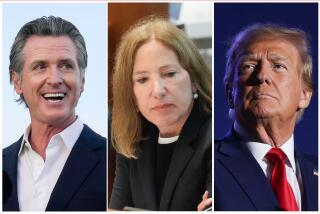California’s top court lets stand ruling that upheld Gov. Newsom’s emergency powers

SAN FRANCISCO — California’s Supreme Court decided Wednesday to let stand a ruling that said Gov. Gavin Newsom’s emergency powers during the pandemic include the right to alter or make new laws.
Two state Republican lawmakers had challenged Newsom’s power, arguing he had no right to issue an executive order requiring vote-by-mail ballots to be sent to the state’s more than 22 million registered voters before the Nov. 3, 2020, election.
A Superior Court judge had ruled that Newsom could not make new laws, but a three-judge panel of the Sacramento-based state Court of Appeal unanimously overturned that decision and said the state’s 1970 Emergency Services Act gave him broad powers during the pandemic.
Republican Assemblymen James Gallagher of Yuba City and Kevin Kiley of Rocklin appealed that ruling to the California Supreme Court. Kiley has since become a candidate to replace Newsom in the upcoming recall election.
Meeting in closed session, the state high court issued a brief order declining to review the ruling or to decertify it so it could not be cited as precedent in future court cases. None of the justices dissented.
While the Republicans’ suit against Newsom was pending, the California Legislature passed a law calling for mail-in ballots to be sent to voters. That mooted the original purpose of the lawsuit, but the GOP lawmakers pressed it to prevent Newsom from changing state law by other executive orders.
The California Constitution gives only the Legislature the power to create new laws. But the appeals court said the emergency services statute gave the governor “police power,” a term the justices said included the right to make new laws.
The court said the law was constitutional because it required the governor to terminate a declared state of emergency as soon as possible and also allowed the Legislature to end it.
More to Read
Sign up for Essential California
The most important California stories and recommendations in your inbox every morning.
You may occasionally receive promotional content from the Los Angeles Times.











